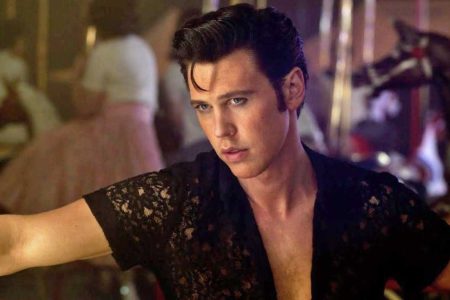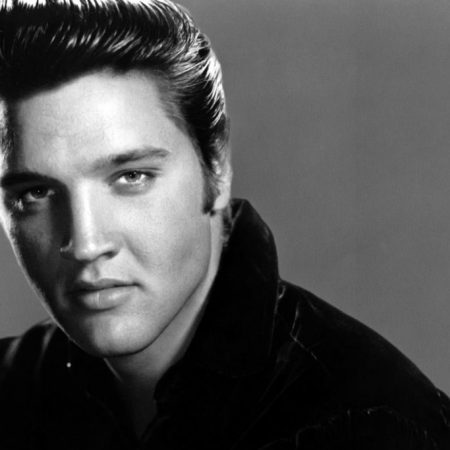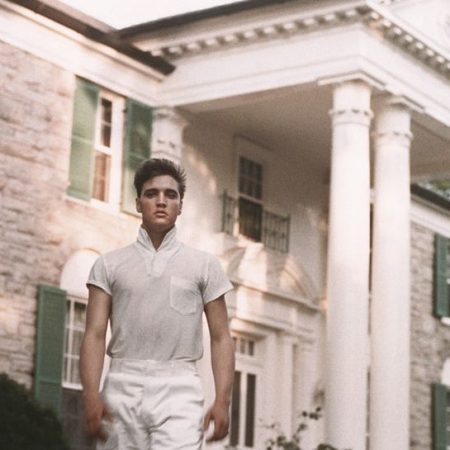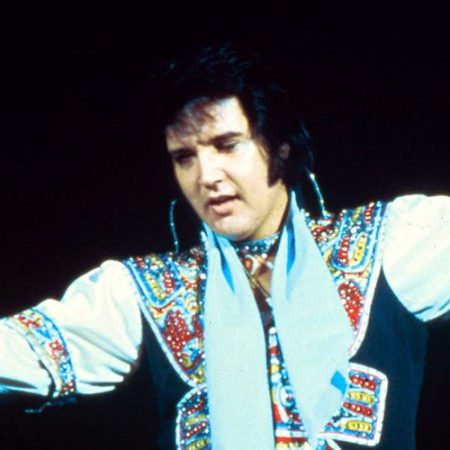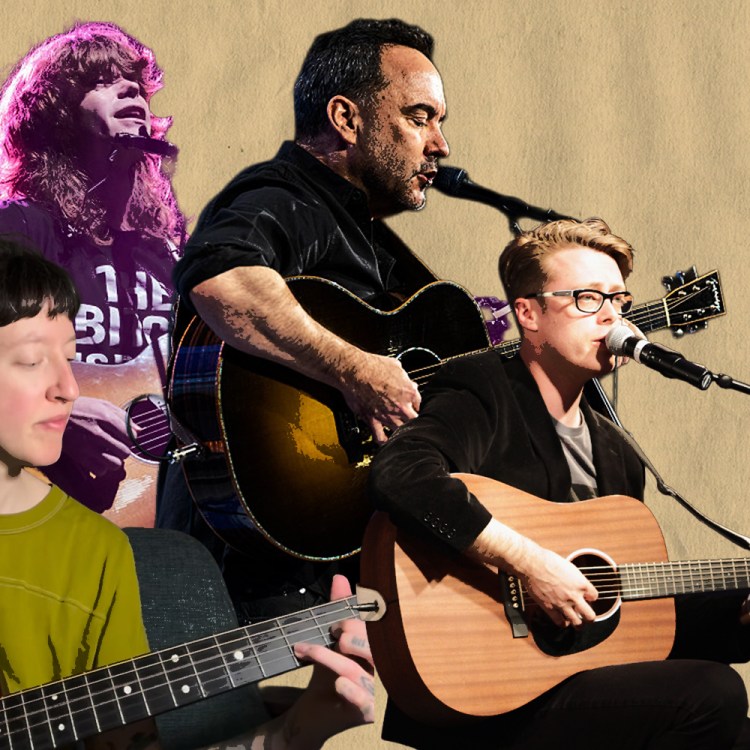In the pantheon of American bucket-list destinations, you’ve got timeless icons like the Grand Canyon and Disneyland, and road trip requisites like Niagara Falls and Dollywood. There’s one place, though, that finds itself in a unique position among its peers — a place negotiating its own cultural resonance amongst younger generations. The Home of Elvis Presley, Graceland opened to the public on June 7, 1982, to more than 3,000 fans who paid $5 admission to be the first to tour the estate five years after the King of Rock & Roll’s death. Today, the 17,552-sq.-ft. Colonial Revival estate has been open for tours longer than Elvis was alive, attracting some 600,000 guests annually and over 20 million visitors total — from Paul McCartney to, likely, your mom. It’s the most popular tourist attraction in Tennessee, and second only to the White House as the most-visited “house museum” in the country.
Graceland has all the trappings of an Americana bucket list; the Mount Rushmore of music, the Disneyland of Rock & Roll. But despite its still-staggering visitation, the hordes of fans who still hold annual candlelight vigils and the booming cottage industry of Elvis impersonators, it feels like Graceland is at a cultural crossroads. Elvis has now been dead longer than he was alive, growing ever distant from younger listeners, and along with recent reckonings around appropriation of Black musical traditions, questions about the continued longevity of his estate inevitably start to swirl.
I’ve been to Graceland twice. The first time, Elvis Presley’s Memphis had newly opened across the street in 2017. The $45 million, 40-acre Graceland adjunct contains restaurants, shops, exhibits, artifacts, a soundstage and vast collections of cars and clothes. Shortly before that, the 450-room Guest House at Graceland opened, providing luxe lodging with themed suites and Elvis music piping through the speakers. My self-guided Graceland tour, with headset narration by Elvis super-fan John Stamos, was swarming with eager tourists. My second trip, last year, revealed more cracks in the patina. Driving to Graceland (along Elvis Presley Boulevard, no less), in Memphis’ Whitehaven neighborhood, the area felt forgotten. Graceland and the nearby Guest House were islands. The tour was quieter, and Stamos’ narration could use a refresh, especially as he spoke about Lisa Marie Presley like she was still alive. Even my husband, an enthusiastic Graceland newbie with a love for classic cars, was less impressed with Elvis’ flamboyant car collection (though, admittedly, bright cherry-red Thunderbirds are bound to polarize even the most ardent car enthusiast).

This isn’t to disparage one of the most influential musicians of all time. I’ll be the first to acknowledge that I’ve never been a particular Elvis fan, nor do I care for cars or fried peanut butter and bacon sandwiches. His music never really resonated with me, and his recording of “Unchained Melody” remains the only Elvis song on my phone. While I walked away from Graceland pondering its age and impact, the ensuing months have left me with unexpected pangs of awe. The more curious I became about Graceland, and Elvis’ legacy, the more enamored I became by its singular capacity to evolve authentically. In talking with Memphis locals, music professionals and Elvis fans alike, I’ve come to to see Graceland — the first Rock & Roll site added to the National Register of Historic Places — as the enduring bucket-list titan it’s always been.
“Elvis is still amazingly relevant to not only Memphians, but people all over the world.” That’s according to Cole Early, the content and archives manager at the Overton Park Shell, where Elvis gave his first live performance in 1954. His music is timeless, but it’s the whole package that Early says makes Elvis such an enduring draw. “I think because Elvis had such a big heart, fundamentally that vibe translates, whether you know a lot about him, or a little,” he adds. “He was salt of the earth, he was charismatic, he was a great-looking guy, he was a simple guy with a young heart, and that’ll continue to translate no matter who you are — across genres and ethnicities.”
His resonance endures in many ways, be it by modern-day artists drawing his influence, or by new films introducing him to younger audiences. The most recent Elvis biopic, directed by Baz Luhrmann, was a box office smash, earning nearly $300 million worldwide, and Oscar nominations aplenty, including Best Actor, Best Sound, Best Makeup and Hairstyling, and Best Picture. When it comes to stirring interest among younger generations, it helps to have an “It Boy” like Austin Butler doing an A+ impression.
Before that, even Disney introduced Elvis to new audiences. “After the Disney movie Lilo & Stitch came out in 2002, there was a massive wave of kids who stumbled upon Elvis, as Elvis was a main focal point in the movie,” explains Alicia Dean, a marketing and public relations expert at Graceland. “Our visitor demographics actually tend to be younger, as we host a lot of traveling high school bands, field trips and school related functions. We host a performing arts camp for kids here at Graceland in the summer. We would average between 30-40 campers every single year, until the Elvis movie came out and our numbers almost doubled overnight.”

Elvis’ impact is one thing, especially with Oscar-caliber movies and recent covers by modern-day heavyweights likes of Kacey Musgraves, but what of Graceland itself?
“I frequently get asked this question when I work with folks from out of town who ask me if they should go to Graceland,” says Scott Bomar, a Memphis-based composer, producer and musician. “My answer is always yes, even if you are not an Elvis fan or do not think of yourself as an Elvis fan.” The house, he says, is a mid-century time capsule with one-of-a-kind interior design and a must-see Jungle Room. It’s a sentiment echoed by Roy Turner, executive director at the Elvis Presley Birthplace in Tupelo, Miss., which he refers to as the Bethlehem to Graceland’s Jerusalem. “It is the 1970s frozen in time, showcasing Elvis’ taste in furnishings of the day, plus some quite eccentric pieces made just for him. When you see all of the gold records and other awards of recognition, you are looking at how he reached people and made the connection.”
Elvis fans agree.
“It’s essentially a peek behind the curtain of a figure who was larger than life,” says Dana Fennewald, a vice president in public relations, and a lifelong Elvis fan who grew up listening to his music with her mom. “When you walk through the house, you almost expect Elvis to round the corner. When you think of legends, it’s typically in an abstract sort of way, where it’s almost hard to believe that they actually existed. But, Graceland is something concrete and tangible that still exists and is directly connected to him. I think that makes people feel closer to his legacy.”
Baz Luhrmann’s “Elvis” Is So Stupid, It Almost Feels Like Parody
The highly anticipated biopic, which debuted at Cannes this week, feels a little too “Walk Hard”And despite the fact that Graceland and its main tours, as Dean explains, haven’t changed much over the years, that timelessness is a testament to the legacy of that place — shag carpeting and all — and the palpable, omnipresent essence of the legend who called it home for 20 years.
“Elvis Presley defines Americana and the American dream,” Dean adds. “Graceland was a place he was proud of and wanted to show off, and when you come here, you can see why. To be able to walk through the same front door Elvis himself walked through, without viewing any rooms behind plexiglass, has an almost indescribable feeling.”
Despite my own admitted hesitations, there’s something endearing about the preservation of a place like Graceland. Sure, the Stamos narration may be a bit dated, but the house itself is a peerless palace of architecture and design, with a lived-in warmth that one might not expect from such an outsized individual like Elvis.
When we look at other attractions tied to larger-than-life individuals, Dollywood is an obvious comparison. As the second-most popular tourist attraction in Tennessee, it’s a destination for Dolly Parton diehards as much as it is for kids who couldn’t pick her music out of a playlist. With seasonal events, a Disneyland-like attention to cleanliness and upkeep, and a steady flurry of new additions — including a new hotel, new rides and The Dolly Parton Experience — it’s easy to see the sustained mass appeal. Graceland, despite lacking theme park attractions and the Great Smoky Mountains, is decidedly more intimate and raw. It might not have the polished sheen and newness, but there’s an authenticity and a humanity that resonates in ways that roller coasters and Cinnamon Bread can’t.
“Graceland seems like an extremely personal reflection of Elvis and his taste,” echoes Bomar. “It is unique and seems very well-preserved, and as it was when he lived there, so it has a time-capsule feel. Other similar destinations are often recreations or something that has been remodeled or changed over the years.”
Changes, as Dean noted, have been minimal, but with a collection of 1.5 million artifacts to rotate through, and additional experiences at Graceland, they’re helping the legacy evolve. “We’ve added multiple UVIP tour options, including the ‘Inside the Archives UVIP’ tour, and now we have the ‘Presley for a Day’ tour. This new exclusive tour offers a bespoke experience with unprecedented access to some of the Presley family’s most beloved places on the Graceland grounds and provides access to some of the Presley family’s most beloved places on the Graceland grounds for the first time since it opened to the public.” On said tour, guests enjoy golf cart rides around the grounds, a horse photo op and a high-end dinner at the newly renovated Moriah’s House, which offers views of Graceland’s landscape from the back pasture.

More recent cultural reckonings around the appropriation of Black musical traditions have cast Elvis’ music in a new light, but his sincerity and his respect as a music-loving outsider are what many say endure.
“Elvis came of age musically during a unique time and place,” explains Bomar. “Memphis was the epicenter of the mid-South where you had a melting pot of Black gospel, blues, R&B and white country, bluegrass and gospel music. The rural and urban colliding, this is what created Elvis’ sound.” More homage than appropriation, Elvis had the respect of many Black musicians who influenced his work. “I have worked with and been friends with African-American musicians who knew Elvis,” Bomar adds, citing guitarist Calvin Newborn as an example. “When Elvis was young, he would come and see Calvin perform and sit in with his band. Calvin had a lot of respect for Elvis. Calvin said Elvis was ‘sanctified.’” He recalls how Elvis would go watch B.B. King perform in segregated Memphis of the ‘50s, and how, in the ‘70s, he worked with a Black gospel group, The Sweet Inspirations: “When Elvis was asked to play in the Houston Astro Dome, he was asked to leave them off the show and Elvis said, ‘I’m sorry, but if my girls don’t come, I don’t come.’ And so, we went.”
It’s Elvis’ genuine love of music that shines through, with The Sweet Inspirations recently inducted into the “Graceland Legends Hall of Fame.” It preserves his musical legacy and influences others, and it keeps Graceland aglow. Coupled with the mega-watt success of Elvis, it’s something as simple as his inherent humanity that makes Graceland such a lasting draw. No matter how titanic Elvis was, this was still a real home.
The surrounding area of Whitehaven, Early explains, needs as much economic support and investment as it can get, especially in the wake of the pandemic, but it’s come a long way since 1977, and Elvis’ family and friends are keeping the spirit of Graceland alive.
“His family is running it now, and Riley [Keough] is super sharp,” adds Early, calling her a great business person and a good face for the organization. “But are their kids and grandkids gonna be musicians? Are they gonna be anywhere near as good as their dad? Are they gonna have a passion? I’m fascinated to see how passionate people would be 10 years from now, and 20 years from now and 30 years from now. But it’s not dropping off yet.”
Looking towards Graceland’s future, Fennewald thinks social media is helping connect younger audiences with Elvis’ music in new ways, while Dean stresses the massive influence the King of Rock still wields over modern musicians and pop culture in general. In the “ICONS: The Influence of Elvis Presley” exhibit at Elvis Presley’s Memphis, countless artists share their own Elvis influences, from Dolly Parton to Dwayne “The Rock” Johnson.
And as long as Elvis remains the heart and soul of Graceland, Early thinks it bodes well for the future. “If they start diluting the Elvis story, then it won’t happen. But if they keep Elvis Elvis, and they keep the family Elvis-centric, it’s a formula for success,” he says. “Graceland brings so many people to Memphis, and as long as it keeps getting passed on to generations, the future looks bright.”
This article appeared in an InsideHook newsletter. Sign up for free to get more on travel, wellness, style, drinking, and culture.

